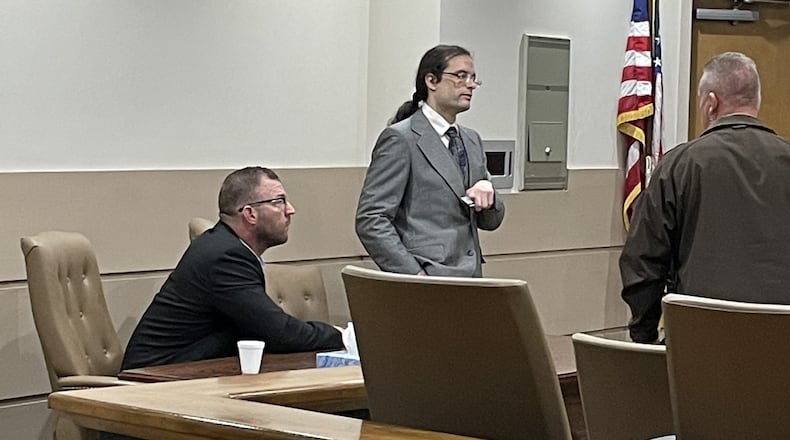A neo-Nazi activist who has been distributing antisemitic flyers around Atlanta’s northern suburbs is on the hook for $20,000 in legal fees after a recent Georgia Court of Appeals ruling.
A three-judge panel with the state appellate court last week affirmed a ruling in Bartow County ordering Michael Weaver, a longtime figure in Georgia’s extreme right, to pay a Cartersville shopkeeper’s legal bills incurred when he sued her for libel.
The case stems from an incident in the summer of 2022 when Weaver and his followers posted multiple negative Google reviews of Valerie Millsaps’ frame shop in Cartersville after Millsaps allegedly made an obscene gesture at him while Weaver was staging a public demonstration in the city.
In response, Millsaps posted a reply to Google saying she was being unfairly targeted by “a Neo Nazi” who was a “known felon of hate crimes” who had threatened others in the community. Weaver seized on the reply and filed a libel lawsuit against Millsaps, claiming she had unfairly defamed him.
Weaver was among several extremists associated with the hate group the Goyim Defense League who had been dropping antisemitic flyers in driveways and parking lots across metro Atlanta. The campaign provided some of the impetus to add a definition of antisemitism to the state’s hate crimes law in a bill passed this year by the Georgia Legislature.
In a hearing in Bartow County Superior Court last February, Senior Judge Shepherd Howell dismissed Weaver’s libel claim, saying Millsaps made “reasonable deductions from all the facts” available to her. Weaver has been associated with several neo-Nazi and racist organizations and was imprisoned after assaulting a Black man in Columbus in 2010.
Weaver’s claim of libel centered on Millsaps’ allegation that he had threatened other “shop members” in the community. Weaver denied that he had threatened anyone, but he admitted to harassing the owner of a local gym that had revoked his membership when he placed offensive material inside.
“She has the right to express her opinion, the same as he has the right to express his opinion,” Howell said from the bench.
The appeals panel agreed with Howell that Millsaps was not acting with malice when she responded to the negative reviews of her business.
“Millsaps knew about Weaver’s membership in organizations advocating race wars and his history of violent criminal behavior,” Presiding Judge Anne Elizabeth Barnes wrote in the unanimous decision. “Millsaps also had heard that Weaver had threatened to kill a local gym owner after the owner kicked Weaver out of the gym.”
In filings, Weaver denied ever threatening anyone, but Barnes wrote that “he has not denied instigating a campaign of harassment against the gym that included negative reviews, vandalism, and repeated phone calls, and he has not shown that no death threat occurred.”
In his earlier ruling, Howell required Weaver to pay Millsaps’ legal costs under a Georgia statute prohibiting lawsuits aimed at limiting freedom of speech in areas of “public interest or concern.” Those legal bills were significant.
Millsaps was represented by the Atlanta-based law firm Kilpatrick Townsend & Stockton. At the hearing, Kilpatrick attorney Jeffrey Fisher estimated the firm had billed about $30,000 defending Millsaps, which Fisher said represented a “substantial discount rate.”
At the hearing last year, Fisher told Howell that awarding attorneys’ fees would deter future harassing claims.
“It’s not about Mr. Weaver coming back,” he said. “It’s about other neo-Nazis.”
Howell settled on $20,000 as a reasonable figure and ordered Weaver to pay it.
“We are gratified that the Georgia Court of Appeals affirmed the trial court’s dismissal of Michael Weaver’s defamation action and award of attorneys’ fees,” Fisher said in a statement to The Atlanta Journal-Constitution. “The opinion reaffirms that defamation claims cannot be used to intimidate and silence individuals, like Valerie Millsaps, who have the courage to speak out against hate.”
Weaver, who did not respond to a request for comment, lashed out on Gab, a social media platform favored by the far right.
“When a court asks me to rise the only thing that shall rise is my middle finger. If the judge says that’s contempt I shall say in open court that the JEWdicial system is contemptible,” Weaver posted following the release of the court opinion. “Don’t try me…..”
Weaver followed with a series of posts listing the three judges on the opinion by name, referring to each of them as the “traitor of the week.” In a separate post, Weaver called Georgia’s judicial system “lawless.”
“I can no longer in good conscience tell others to obey unjust laws when tyrants in black robes use lawfare to punish political dissidents,” he wrote.
While Weaver’s posts contained no specific threats or calls to action, they fit a trend of heightened rhetoric and abuse aimed at public officials over the past several years.
A new report by the Brennan Center for Justice, a liberal public policy organization, found more than a third of state legislators have experienced an increase in abusive comments from the public since taking office, ranging from insults to threats of harm. And this week, Reuters reported that data from the U.S. Marshals Service showed serious threats to federal judges have doubled since 2021.
About the Author



